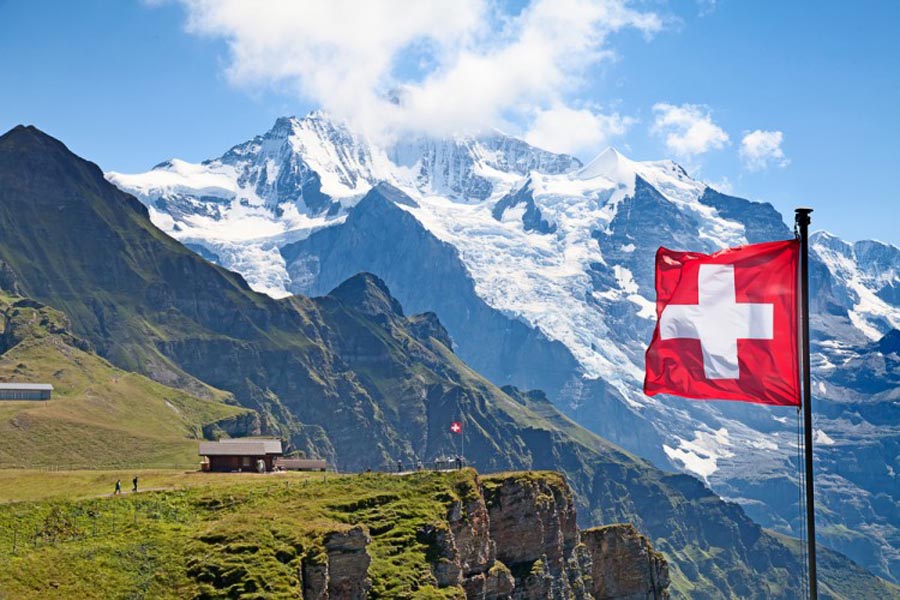
Switzerland flag over the Alps view
According to a 2014-2015 Global Competitiveness Report, Switzerland ranked first in the whole world. It remains the most competitive, clinching the seventh position in the world, reporting high scores in government effectiveness, human development, human rights and high quality of life.
The impressive performance shows how fast this country has rebuilt itself from the previous financial crisis. For many years, the nation has been a tax haven for the wealthiest individuals in the world. This has, however, changed after the US-led clampdown on tax evaders worldwide, low-interest rates and the low financial market volatility.
The increased pressure on the banks to abide by the new regulations caused many private banks to close down and others lose significant amounts of cash in bailouts and mass client withdrawals. It’s surprising that most wealthy individuals still consider this Alpine country the safest to invest their monies. The next text further explains why this is so:
- Factors that contribute to the success of its economy
- Its soft power
- How the culture of innovation and competitiveness has become embedded in the nation
- How it rebuilt its brand
Factors that lead to the success of its economy
Several factors have contributed to the success of the nation’s economy among them being transparent and effective institutions, excellent infrastructure, healthy public finances, a flexible labour market, high capacity for innovation and high-quality education system. Its peaceful relations within and without is another bonus that aids in the success of this country’s economy.
Its low unemployment rate is envied by other European economies. Only 8% of the population is jobless while most European countries are in a financial crisis, reporting 25% rate in unemployment. But, what keeps this country’s unemployment rate so low? First, the country has adopted a dual vocational and education training system that values apprenticeship. This approach provides an effective remedy for the youth unemployment. Secondly, it acknowledges human capital is its greatest asset hence, creates systems for the maximum utilisation of this asset. The collaboration between employers and employees and the implementation of systems that attract and retain talent helps reduce the unemployment rate.
Its soft power
Despite the nation’s small population of 8 million people, it is home to various international bodies like the World Health Organization and the World Trade Organization. It also hosts annual global meetings like the World Economic Forum in Davos and the second headquarters of the United Nations, Geneva, is also found here. Its ability to host some of the biggest organisations in the world has increased this nation’s soft power.
The culture of innovation and competitiveness
The 2018 Global Talent Competitiveness Index shows that Switzerland excels at retaining domestic talent. In fact, Zurich, the country’s most popular city clinched the first position, an improvement from last year’s report. It only shows this country’s deeply entrenched culture for innovation and competitiveness. To begin with, this country leverages the diversity of its population and especially that of the young people. According to the Swiss Federal Statistical Office, 64% of Swiss people speak more than one language, and 26% use more than three languages.
This is because Swiss citizens grow up in a diverse environment right from their childhood. Elementary schools from different regions in the country visit each other for exchanges, which further aids in the country’s diversity and retention of a highly skilled workforce. As a result, big companies like Disney, Google, Microsoft, Roche and Novartis run their research centres from Switzerland. The country also boasts a history of direct democracy and strong federal independence, which has caused districts to compete for tech excellence hence, increasing competitiveness within and without the country. What’s more, other large companies will want to set base here as the country hardly runs into a financial crisis or risk of reputation.
Rebuilding the nation brand
According to the 2018 Best Countries report, this country clinched the first position among 80 countries in the world. This position further strengthens its national brand on the global stage. Studies about the best countries not only rely on the country’s military vigour, economic power or risk of reputation as the main determinants of its brand success but also its level of innovation and compassion to win over audiences.
The country has excelled in all these factors as the report showed it is the most progressive country in social and environmental policies. Additionally, the country retains a positive image in terms of governance, the potential for innovation, economic attractiveness, exports and quality of life.